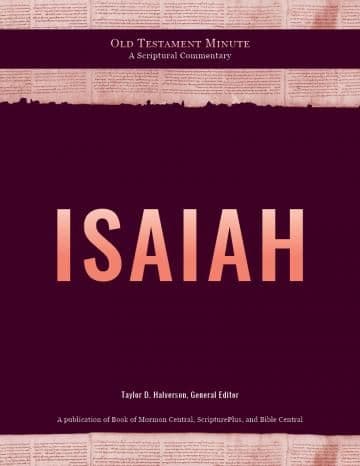Book
66 Chapters

Isaiah 55
Jehovah invites all who are thirsty to come to the waters, which symbolize Jehovah Himself—He is “the fountain of living waters” (Jeremiah 2:13; 17:13; Psalm 36:8–9; see also Ether 12:28). Isaiah’s words are echoed by Jesus: “If any man thirst, let him come unto me, and drink” (John 7:37). Just as water is an absolutely necessary substance to maintain life on earth (including human life), the Lord is indispensable for spiritual life, and, eventually, eternal life. come buy wine and milk without silver and without price. The blessings of the gospel cannot be purchased with earthly means of payment, such as silver. “Wine” is a symbol of the sacrament, or Jesus Christ’s blood (Doctrine and Covenants 20:79). When Jehovah prepares a feast for the righteous, it includes “mature wine,” speaking symbolically of the blessings of His Atonement (25:6–8). “Milk” is a symbol of the blessings of the covenant land, which is promised to the faithful (Exodus 3:8).
Why do you spend your silver for that which is not bread? Compare 52:3. “Bread” represents Jesus Christ (John 6:35, 51); the sacrament bread symbolizes His body (3 Nephi 20:8; Doctrine and Covenants 20:77). Bread, like water, is a basic food substance that is necessary to sustain human life. When we spend our money for things other than bread, we are wasting our efforts on things that do not have lasting value. The Lord also asks, “Why do you spend . . . your labor for that which does not satisfy?” let your soul delight itself in fatness. “Fatness” symbolizes the blessings of the gospel. Jacob paraphrases this verse in 2 Nephi 9:51.
come to Me. Thus Jehovah commanded. Similarly, Jesus Christ exhorted His disciples and those in the latter days, “Come unto me” (Matthew 11:28; Doctrine and Covenants 10:67; see also Moroni 10:32). Hear, that your soul may live. The Hebrew shm‘, translated “hear,” also means “to obey.” When we obey God’s words, we will have an abundant life in mortality as well as eternal life in God’s kingdom. I will make an everlasting covenant with you. The “everlasting covenant” is the gospel (Doctrine and Covenants 66:2; 133:57) with its sacred covenants and ordinances. sure loving-kindnesses of David. Paul equates this phrase with the Resurrection (Acts 13:34). Why David? Even though David had committed great sins, the Lord promised him the Resurrection (see also 2 Samuel 7:12–17); thus, all of us may have the same hope.
I made him a witness to the peoples. The antecedent of “him” is David. He was a witness of the Lord and His greatness (Psalms 9:11–12; 18:49–50; 57:9–11; 145:21). He was also “a leader and commander of the peoples.”
you will call a nation, . . . a nation . . . will run to you. The Lord is addressing covenant Israel, informing them that they will take the gospel to other nations (“call a nation”), and the other nations will respond positively (they “will run to you”). He has glorified you. The Lord has glorified His covenant people.
What must we do to receive the free gift of salvation (see 55:1–3)? Seek the Lord (55:6); call upon Him (55:6); forsake our evil ways, including our unrighteous thoughts (55:7); and return to the Lord (55:7). In return, the Lord will have compassion on us, and “He will abundantly forgive.” The Lord knows what is best for us because His thoughts and ways are higher (or greater) than ours (55:8–9).
call upon Him while He is near. The Lord paraphrases these words in our own day: “My friends, I leave these sayings with you to ponder in your hearts, with this commandment which I give unto you, that ye shall call upon me while I am near” (Doctrine and Covenants 88:62; emphasis added).
Let him return to the Lord. Return (Hebrew shuv) means to repent.
The Lord teaches with a chiasmus that is now famous: my thoughts/my ways/heavens/ /earth/my ways/my thoughts. Basically, the Lord is stating in these verses, “I know better than you do.”
rain and the snow come down, . . . My word goes forth. These gifts from God bless us with food (“giving . . . bread to the one who eats”), and similarly, God’s word blesses us with spiritual food.
with rejoicing/with peace. When Israel is gathered to Jesus Christ and His gospel, she will do so with “rejoicing” and with “peace.” mountains and hills will break forth before you in singing/trees . . . will clap their hands. When Israel is gathered, nature itself will join in the rejoicing and singing (44:23; 49:13; 1 Chronicles 16:33; Doctrine and Covenants 128:22–23).
thorn . . . and briar. Two symbols of God’s judgments (5:5–6; 9:17–18; 34:13) that point back to the shift that occurred after the fall of Adam. Opposite thorns and briars, the “cypress” and the “myrtle” are symbols of blessings and prosperity of the land. Thus when Israel was scattered, the land was cursed, but when Israel returns, the land will be blessed and will produce abundantly for the Lord’s covenant people. to the Lord for a name; for an everlasting sign. The earth producing abundantly will serve as an everlasting sign to all.
Book
66 Chapters
Items in the BMC Archive are made publicly available for non-commercial, private use. Inclusion within the BMC Archive does not imply endorsement. Items do not represent the official views of The Church of Jesus Christ of Latter-day Saints or of Book of Mormon Central.